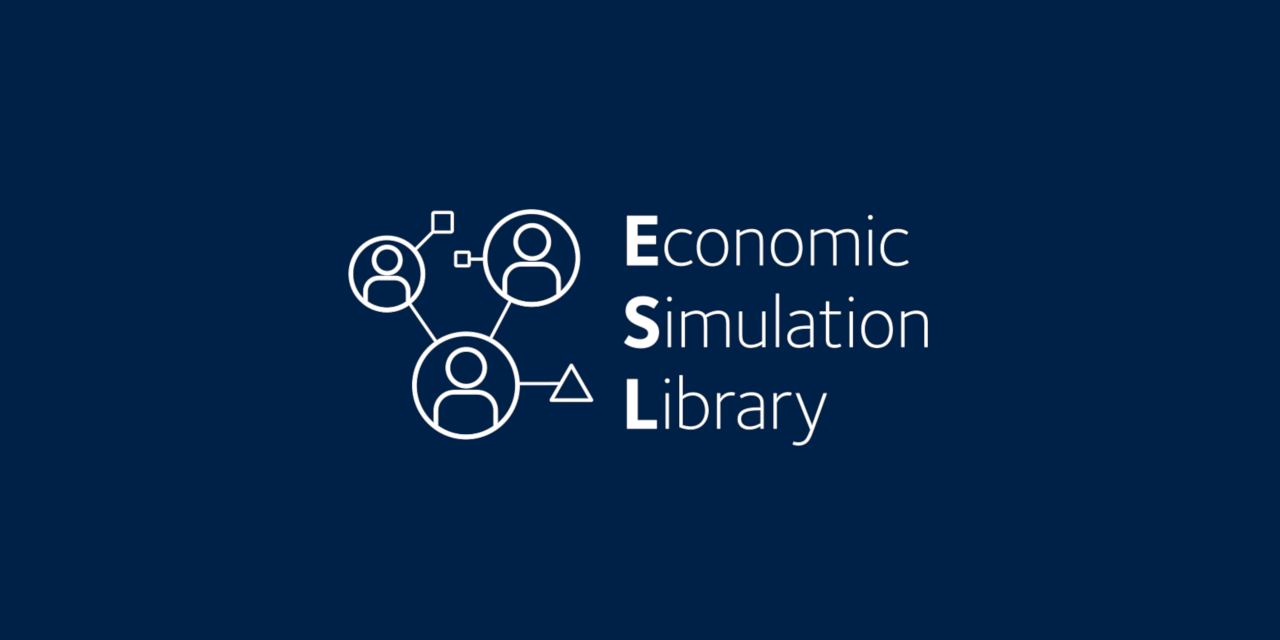The Economic Simulation Library (ESL) provides an extensive collection of high-performance algorithms and data structures used to develop agent-based models for economic and financial simulation. The library is designed to take advantage of different computer architectures. In order to facilitate rapid iteration during model development the library is developed to be used from Python, and is written in C++.
The library provides multiple market mechanisms that use the same messaging framework, meaning market mechanisms can to a limited extended be swapped and compared within the same economic model. We aim to provide simple models that allow, for example, to convert directly supply- and demand functions to an execution strategy, so that a Walrasian price-setters can be compared to order-driven markets such as limit order books.
-
Walrasian price-setter, supporting market clearing for multiple assets using a numerical scheme, accelerated by automatic differentiation.
-
Multiple Limit order books with different performance characteristics.
-
Shapley-Shubik trading-posts. Trade Using One Commodity as a Means of Payment. Shapley, L. and Shubik, M. Journal of Political Economy 1977 vol: 85 (5) pp: 937-968.
-
Common types of auctions
We aim to provide optimized packages for Linux, MacOS and Windows for Python 3.6 and later. These are automatically delivered to Pypi, and can be downloaded and installed using pip.
pip3 install eslpyFor linux, we build packages for the manylinux2014 platform, which provides compatibility with a large number of recent versions of popular distros.
We test on Centos 7 and Ubuntu 20.04.
Precompiled packages are built without MPI support, as there are several implementations available and in practice the desired MPI implementation is imposed by the computing environment. Therefore, MPI users are encouraged to build the package from source code, and compiling for a specific computing environment may yield performance gains that are not available from a generic package.
Python packages are developed for macOS deployment version 10.9 and newer. Note that upon installation from inside a graphical interface, the installer will request the installation of the relevant Apple XCode developer tools through a dialog menu if not yet installed. This process may repeat multiple times depending on which development tools are already installed. These dialogs may be accompanied by the following message in the terminal:
xcode-select: note: no developer tools were found at '/Applications/Xcode.app', requesting install. Choose an option in the dialog to download the command line developer tools.
Build configuration supports both Microsoft Visual C++ and Mingw-w64 based builds. We recommend cmake-gui to generate project files for Visual Studio. For Mingw-w64 based builds, we recommend MSYS2 to install boost and gsl dependencies.
Users can also build the Python package from source and install it directly. For this, the following dependencies need to be satisfied:
- C++17 compiler
- CMake >= 3.12
- GSL >= 2.3
- Adept >= 2.05
- Optional: any Boost.MPI compatible MPI development library, such as OpenMPI
- Python >= 3.6 development headers, libraries, and optionally binaries to run unit tests.
- Boost >= 1.65, with Boost.Python configured (mandatory) and Boost.MPI (optional)
Once the dependencies are satisfied one can build install with pip (provided PEP 517 is supported, which is the case for recent updates of pip)
pip3 install .Build with N processes:
mkdir build
cd build
cmake ../
make -jN
make testBefore releasing a first version, we do not maintain detailed documentation. Usage examples can be found in the test cases. Python examples to follow.
Example taken from: https://github.com/INET-Complexity/ESL/blob/master/example/order_book.cpp
// import the order book
#include <esl/economics/markets/order_book/book.hpp>
// import currencies, because we will be trading the stock against USD
#include <esl/economics/currencies.hpp>
// we will fix the namespace mess once the API stabilises
using namespace esl;
using namespace esl::economics;
using namespace esl::economics::markets::order_book;
using esl::economics::markets::order_book::limit_order;
using namespace esl::economics::markets::order_book::statically_allocated;
// trades in this market are in multiples of the lot size
// e.g. a lot_size of 100 means that a buy order for a quantity of 3 buys 300 shares
// A larger lot size enables small tick sizes
constexpr size_t lot_size = 100;
// helper function to create limit orders submitted to an exchange.
// note that ESL uses fixed-precision for prices internally, and that the use of
// a floating point type here relies on the developer understanding the
// conversion.
limit_order create( double p
, size_t q = 1000
, limit_order::side_t side = limit_order::side_t::sell)
{
// substitute your own stock ticker type here
esl::economics::markets::ticker ticker_dummy_;
// substitute your agent id
identity<agent> owner_dummy_;
return limit_order
( ticker_dummy_
, owner_dummy_
, side
, markets::quote(price(p, currencies::USD), lot_size * currencies::USD.denominator)
, q
,limit_order::lifetime_t::good_until_cancelled
);
}
//
int main(int argc, char** argv) {
// create the range of valid prices for the order book (inclusive)
// quote is a generic type which can be a price, interest rate, etc
auto min_ = markets::quote(price( 0.01, currencies::USD), lot_size * currencies::USD.denominator);
auto max_ = markets::quote(price(10.00, currencies::USD), lot_size * currencies::USD.denominator);
// define the maximum number of open orders
// as the statically_allocated::book maintains a fixed-size memory pool
constexpr size_t max_orders_ = 1'00'000;
// creates the order book
auto book_ = std::make_unique<book<max_orders_>>(min_, max_);
book_->insert(create(4.75, 500, limit_order::side_t::buy));
book_->insert(create(4.75, 750, limit_order::side_t::sell));
// use book_.reports to view the output generated by the order book, which contains
// 1. the placement of the buy order
// 2. matching 500 of the buy and sell order (confirmed for each agent)
// 3. placement of the remainder 250 of the sell order
}The library uses unit testing on both the native library (Boost.Test) and the Python bindings (pytest and Hypothesis).
This open-source project is organized by the Institute for New Economic Thinking at the Oxford Martin School. Work on this open-source project is in part funded by the J.P. Morgan AI Faculty Awards 2019 and 2020.
